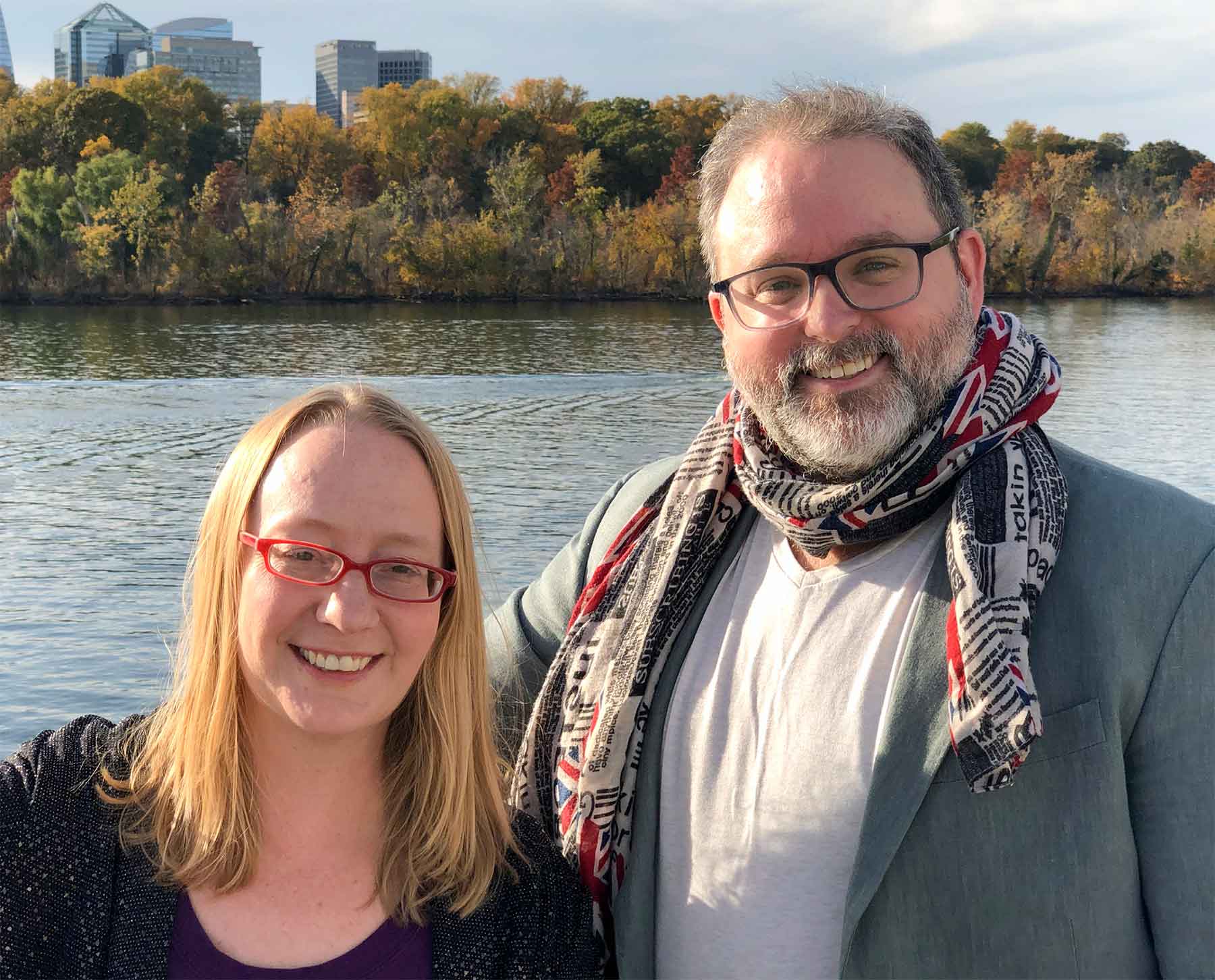artistic fusion
Making Music Together
shi Day ’04 sees a not-so-golden thread woven through human history: witch hunts, in which persecutors exert accusations of wrongdoing against powerless victims. “This is a thing that societies keep doing over and over again, and we are failing to learn from it,” she says.
Day tackles this abuse of power through a one-act opera she composed, Waking the Witch. She workshopped the opera in December in Washington, D.C., with director Lee Cromwell ’05 in preparation for an eventual premiere performance. The duo forged both their friendship and creative partnership while studying together at Bucknell.
Waking the Witch received funding last year from OPERA America’s Opera Grants for Women Composers: Discovery Grants program, supported by the Virginia B. Toulmin Foundation. “It gives you some funds to pay musicians, rent space, pay for music copying or whatever it is that you need in order to transform the piece from an idea in your head into something you could bring to opera or theatre companies looking to produce new works,” Day says.


Turning Traditions Upside Down
Day and Cromwell’s creation looks and sounds nothing like the grand operas people either love or loathe. They use a single character — a witchfinder from centuries ago. He is the only singer on stage, and he’s played by a countertenor, not a booming bass as one might expect. (Day crafted the part for Min Sang Kim, assistant professor of music at Austin Peay State University, who specifically requested she write a piece in which he would get to play a villain instead of a baroque hero as he’s usually cast.) There are only five musicians — a Pierrot ensemble of flute, clarinet, violin, cello and piano — and they appear on stage, not in the pit.
And the alleged witch? That would be the audience. “It’s going to have a 360-degree inclusionary feel in the way he’s interrogating them,” Cromwell says. Audience members might even be asked to move around the performance space, mimicking the way accused witches were kept walking during days-long trials.
Some of the musicians double as “animal familiars” — furry accomplices of the accused who pop up in the audience in surprising ways (the flutist, for example, portrays a mouse). “This element of playfulness contrasts with what’s happening and hopefully will add a sort of dynamic where the audience not only feels like an accused witch but also feels the absurdity of the situation,” Day says.
Day and Cromwell further buck tradition by blurring the line between their roles. “What’s great about our collaboration is that I’m not just coming in at the end when it’s fully formed and creating this production,” Cromwell says. “Because we live near each other, because we’re friends, I’ve been a sounding board along the way.”
On Parallel Paths
The friends have been sounding boards for each other ever since they met at Bucknell, when Day was a sophomore major in composition and Cromwell was a first-year music and theatre double-major. “If you’re in music and theatre, which we both were, you kind of inevitably spend a bunch of time together,” Days says. “We just became really good friends as people who were straddling both of those disciplines.”
One of their earliest collaborations occurred when Cromwell was performing in a musical called Gutter Balls that an alumna was workshopping on campus. “I was part of a group that sang a whole song about Lee’s character and how swoon-worthy he was,” Day says.
After graduation, the friends followed parallel paths. Both earned master’s degrees from Westminster Choir College of Rider University, both launched careers (first in teaching and then in producing) and both migrated to Washington, where they both work for the Washington National Opera.
Day arrived in D.C. while Cromwell was completing his MFA at Indiana University. “Every so often, I would get a message from Ashi like, ‘If you lived here, we could use these free tickets to the Alvin Ailey show tomorrow’ or ‘I found this great new place to eat Ethiopian food,’ ” he says. “Just these subtle hints — maybe not so subtle, actually.”
Lessons in Self-discovery
Day and Cromwell’s career paths aren’t the only parallel they’ve shared since their days at Bucknell. They were both on the receiving end of influential guidance that helped shape who they are.
Day’s composition teacher, the late Professor William Duckworth, instilled in her the confidence to heed her own voice, even as she listened to other people’s feedback. His empowerment led her to compose music for two mainstage productions, which went far beyond the course requirement of her theatre minor.
Meanwhile, Cromwell’s choral mentor, Professor Emeritus Bill Payn P’00, helped him develop as a conductor — something that was never on his radar. And he was able to lead actual choral and theatrical performances long before his senior year. “It wasn’t like you got to your senior year and that was your one chance to do something,” he says.

Lee Cromwell ’05
The personalized instruction the pair got at Bucknell prepared them well for graduate school and beyond. “Because the departments of music and theatre at Bucknell are kind of small, they really can make things bespoke for you,” Day says.
There was plenty of crossover between the disciplines, which made it “really exciting to bring different ideas together to help shape and inform a unified artistic idea,” Cromwell says.
It’s all shaped their perspectives as they work together to illustrate the challenges of society today through the eyes of a witchfinder of yesteryear. And if the work helps to ease those challenges, it will be a grand opera indeed.